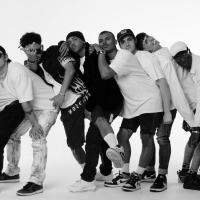 Album Walkthrough: Perth rap collective Rich Valentine break down L’avenir C’est NousSince coming together in 2017, the nine-strong hip-hop collective put in the work to create a defining debut album that they now walk us through.
Album Walkthrough: Perth rap collective Rich Valentine break down L’avenir C’est NousSince coming together in 2017, the nine-strong hip-hop collective put in the work to create a defining debut album that they now walk us through.

Album Walkthrough: Farhot guides us through the beauty of Kabul Fire Vol. 2
On the follow-up record to his acclaimed Kabul Fire Vol. 1, the Hamburg musician shines a light on cultures and sounds plucked from the entire world.
Farhot's music can often be quite difficult to explain accurately, but that's a part of his charm. The Afghan-born, now German-based producer is unlike anyone else, absent of comparatives as he fuses together cultural and musical pickings from his Kabul-based background with the experiences and inspiration he gains as an immigrant to Hamburg; a place where the musician's art has thrived amongst the freeing, multi-faceted nature of the city's art scene.
It's largely built from hip-hop production in a similar way to musicians like the late J Dilla, yet does so in a way that builds from that aforementioned meeting of worlds that far-removes it from contemporary producers. There are flourishes of instrumentation and melodies from his Afghani culture with splashes of jazz and soul thrown in there too, all rooted down by his knowledge of percussion and subtle production that's seen him enlisted by Giggs, Isaiah Rashad and Talib Kweli as a producer (alongside many, many more - Farhot's credits are near-endless).
On his breakthrough Kabul Fire Vol. 1, Farhot established the foundations of this backdrop of sounds, enlisting some of those aforementioned collaborators for the process. Now, seven-something years later, we get a sequel, and an opportunity to flourish in the evolution and growth of an artist that's always felt like a step ahead.
Arriving last week, Kabul Fire Vol. 2 is a worthy successor to the original. It's indebted to his work in hip-hop while still flourishing with the sheer beauty of Afghani art, brought forward into 2021 and presented in a way that feels unlike anything else. Across the space of 30-minutes, you're transported into another world; swirling sampling and thick-coated instrumentation dancing amongst a backdrop of rich culture and storytelling that - even with only the slightest of vocals - elevates Farhot's storytelling to the highest level.
Kalun, for example, triggers snapping snare hits amongst woozy-like bass guitar and vocal sampling. It smoothly transitions into the orchestral dance of Yak Sher - a song whose closest equivalent would maybe be an off-kilter The Avalanches - and then into Check, which switches again into a more contemporary hip-hop tune, featuring German rapper JuJu Rogers and the Erykah Badu-comparable German musician Nneka.
There are left-field combinations like these littered amongst Kabul Fire Vol. 2, where the sole linking quality between its sweeping rhythms seem to be Farhot's dexterity and grace - the touch of slick polish that brings it all together - and the culture that it builds from. "When it was time for Vol 2 I had to do some homework," he says on the record. "I was thinking of the title Kabul Fire, and I thought, ‘I need to make a connection to the country’, I watched films and listened to the music and checked out art from Afghanistan, and what I found was just incredible to me and very inspiring, so I dug deeper."
There's a lot to it, but you can take a dive into it below, alongside a track-by-track walkthrough that details the album's themes and creation one song at a time.
01 Bale, Bale (Intro)
Bale means “yes” or “hello” in Dari (Afghan language). I recorded the first ten seconds of the album with an iPhone. Later on, I recorded that same piano with proper microphones. Bale, Bale features Koko from Opium War, an amazing film by Siddiq Barmak. The movie was a huge inspiration for this album.
02 Kalun
Kalun means “big” in Dari. I sampled the female vocals from Three Dots by Rola Sadat. This is a classic hip hop beat featuring eBass, a guitar and some chopped vocal samples. A real catchy tune from Herat, Afghanistan.
03 Yak Sher
Yak Sher means “a Poem”. I had already made the beat but when I found a poem by Muhammad Is’Hagh Fayez recited by A.M. Mahsoud, I knew I had to flip those strings again. To me, Yak Sher is a song that lifts you up when you’re down. It reminds you of your self-worth and your own strength when you’re struggling to see it.
04 Check feat JuJu Rogers, Nneka
Kabul Fire Vol. 2 is mostly an instrumental album but I’m glad I got my longtime partners Nneka and JuJu Rogers to support me on this one to get this important message across: never forget to check yourself!
05 Kishmish
Kishmish means “raisins” – a common ingredient in Afghan cuisine. Not just in sweet tidbits but also in main dishes. I love them and this song pays homage to this wonderful fruit.
06 Feel Ugly feat Maverick Sabre, Tiggs The Author
Think I made the raw version of this beat in 10 minutes. Maverick freestyled his part when he first heard it. I’m so happy I witnessed this little miracle. Tiggs really killed his verse. Love how pure and honest they both sound. And I’ll probably still like the song in ten years.
07 Azadi
Azadi means “liberty”. I found a documentary from the 60s or 70s on YouTube. It featured lots clichés but also some true statements like this one: “freedom-loving Afghans cherish their own freedom above everything else.” I had to re-record that particular sentence spoken by an Afghan woman. And I hope they are able to change Afghanistan for the better.
08 Pul
Pul means “money”. I actually believe this is the best hip hop beat I ever made. I played everything on a Yamaha CP 70 mixed with a little guitar lick from the 70s. Think it was from an Indian record.
09 Sampling Watana
Watana means “homeland”. I’m very grateful that my good friend Moshtari, who’s Afghan too, explains the art of sampling and what I did on this album. Please check out her art – she’s incredible.
10 Arusi
Arusi means “wedding” – for the intro of this song I sampled a group of young girls talking about their weddings in the future. I got the sample for the song from Three Dots by Roya Sadat. Some people said this beat sounds like an Indian wedding… hahaha! The brass samples are Jiddish. And I brought them to Afghanistan. I like that. Additional flutes and guitars were recorded by my friend Daniel Kimaz.
11 Ahange Qadimi
Ahange Qadimi means “old song”. This pays homage to Afghan legend Ahmad Zahir. I sampled some of his vocals from Oh Jano Bano. It’s the only tune on the album that you could play in a club if there was no Covid.
12 Baqi Manda
Baqi Manda means “what remains”. It’s a mellow tune that features my favourite keyboards – Old Upright and a Celesta.
13 Shirin (Outro)
Shirin means “sweet”. On this one, the singer I sampled admires a woman passing by. This is how the album ends and I hope you’ll enjoy this little trip to Kabul and Afghanistan that I took via YouTube and Google. Big shoutouts to Wahid Samadzada, Moshtari, and Siddiq Barmak for their great support.
 Album Walkthrough: Perth rap collective Rich Valentine break down L’avenir C’est NousSince coming together in 2017, the nine-strong hip-hop collective put in the work to create a defining debut album that they now walk us through.
Album Walkthrough: Perth rap collective Rich Valentine break down L’avenir C’est NousSince coming together in 2017, the nine-strong hip-hop collective put in the work to create a defining debut album that they now walk us through.
 The Kid LAROI is on track to be the youngest solo Australian to have a #1 albumThe Kamilaroi rapper's latest mixtape - F*CK LOVE (SAVAGE) - is aimed to hit #1 in Australia next week, after sitting in the top three the last two weeks.
The Kid LAROI is on track to be the youngest solo Australian to have a #1 albumThe Kamilaroi rapper's latest mixtape - F*CK LOVE (SAVAGE) - is aimed to hit #1 in Australia next week, after sitting in the top three the last two weeks.